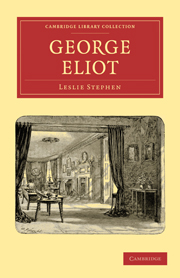Book contents
- Frontmatter
- Contents
- CHAPTER I EARLY LIFE
- CHAPTER II COVENTRY
- CHAPTER III “THE WESTMINSTER REVIEW”
- CHAPTER IV “SCENES OF CLERICAL LIFE”
- CHAPTER V “ADAM BEDE”
- CHAPTER VI “THE MILL ON THE FLOSS”
- CHAPTER VII “SILAS MARNER”
- CHAPTER VIII MIDDLE LIFE
- CHAPTER IX “ROMOLA”
- CHAPTER X “FELIX HOLT”
- CHAPTER XI “THE SPANISH GYPSY”
- CHAPTER XII “MIDDLEMARCH”
- CHAPTER XIII “DANIEL DERONDA”
- CHAPTER XIV CONCLUSION
- INDEX
CHAPTER III - “THE WESTMINSTER REVIEW”
Published online by Cambridge University Press: 05 July 2011
- Frontmatter
- Contents
- CHAPTER I EARLY LIFE
- CHAPTER II COVENTRY
- CHAPTER III “THE WESTMINSTER REVIEW”
- CHAPTER IV “SCENES OF CLERICAL LIFE”
- CHAPTER V “ADAM BEDE”
- CHAPTER VI “THE MILL ON THE FLOSS”
- CHAPTER VII “SILAS MARNER”
- CHAPTER VIII MIDDLE LIFE
- CHAPTER IX “ROMOLA”
- CHAPTER X “FELIX HOLT”
- CHAPTER XI “THE SPANISH GYPSY”
- CHAPTER XII “MIDDLEMARCH”
- CHAPTER XIII “DANIEL DERONDA”
- CHAPTER XIV CONCLUSION
- INDEX
Summary
Upon her return from Geneva, George Eliot had gone to the Brays, with whom she stayed for some months. A turning-point in her life was now to occur. The Westminster Review, started originally by the Benthamites in their most hopeful days, was in its normal state of insufficient circulation. J. S. Mill had given it up when the decline of the “philosophical radicals” made the management of their organ a thankless task. Since his day it had been in the hands of Mr. Hickson. It was now to be transferred to Mr. Chapman, who hoped to make it an adequate organ for the best liberal thought of the day. He paid a visit to the Brays in October 1850 with Robert William Mackay, an amiable and accomplished man whose chief work, The Progress of the Intellect, had just appeared. George Eliot wrote a sympathetic review of this book for the Westminster Review. Her article was in the number for January 1851, and was the first writing in which she attempted anything more ambitious than translation. Mackay's aim, as she defines it, was to show that “divine revelation” is not to be found exclusively in the records of any one nation, “but is coextensive with the history of human development.” A phrase about the “inexorable law of consequences” shows that she was still a disciple of Bray, who praises her for illustrating that “law” in her novels. She seems, too, to have accepted the phrenology of Combe and Bray, as is shown by occasional references to the “anterior lobes” of such great men as Dickens and Professor Owen, whom she was presently to see.
- Type
- Chapter
- Information
- George Eliot , pp. 39 - 50Publisher: Cambridge University PressPrint publication year: 2010First published in: 1902



